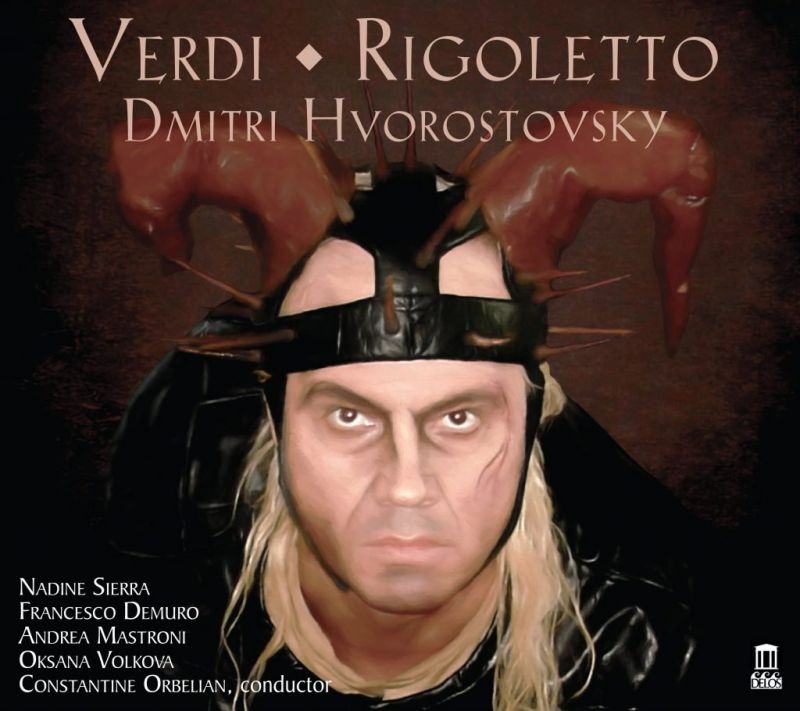VERDI Rigoletto (Orbelian)
View record and artist detailsRecord and Artist Details
Composer or Director: Giuseppe Verdi
Genre:
Opera
Label: Delos
Magazine Review Date: 03/2018
Media Format: CD or Download
Media Runtime: 127
Mastering:
DDD
Catalogue Number: DE3522

Tracks:
| Composition | Artist Credit |
|---|---|
| Rigoletto |
Giuseppe Verdi, Composer
Andrea Mastroni, Sparafucile, Bass Constantine Orbelian, Conductor Dmitri Hvorostovsky, Rigoletto, Baritone Francesco Demuro, Duke of Mantua, Tenor Giuseppe Verdi, Composer Kansas City Symphony Orchestra Men of the Kaunas State Choir Nadine Sierra, Gilda, Soprano Oksana Volkova, Maddalena, Contralto |
Author: Mark Pullinger
Vocally, the young Hvorostovsky reminded me much of Ettore Bastianini; he cited the Italian baritone as one of his great idols. Bastianini was another singer whose life was cut tragically short due to cancer. In the 1960s Bastianini only disclosed his health battles with his closest family and friends – Franco Corelli was one of his few colleagues who knew – sometimes suffering a hostile reception for some rough later performances. He was booed as Scarpia at the Met in 1965 (his final year on stage). The world is a smaller place now and, thanks to social media, we all knew of Hvorostovsky’s ongoing treatment for a brain tumour, desperately willing, praying for a recovery. The ovation for his ‘Cortigiani’ at a Met gala last May was a tremendous outpouring of love from his adoring public.
Sadly, but inevitably, Hvorostovsky’s voice in this recording (made in July 2016) is a shadow of his younger self. Gruff and effortful, it lacks the smoothness and juiciness of former years. All the artistry and intelligence is still there – there is real bitterness to his ‘Pari siamo’ monologue – though you’re conscious of his effortful snatching for breath. The opening of Rigoletto’s great aria ‘Cortigiani, vil razza dannata’ is full of explosive bluster, but the closing section ‘Miei signori … perdono, pietate’ lacks the legato silkiness of old. The jester was also one of Bastianini’s great roles, captured on disc in his prime under Gianandrea Gavazzeni with the Maggio Musicale Fiorentino, even if it is hampered by a curiously murky recording.
Delos has gathered a decent supporting cast for Hvorostovsky. Nadine Sierra, as Gilda, has a bright, forward sound – not unlike Renata Scotto on that Gavazzeni account – but it’s rather aggressive and relentless. Her ‘Caro nome’ is interminably slow, with lots of self-admiring pretty notes held for far too long, and there’s little dramatic involvement. Francesco Demuro is a breezy Duke of Mantua, a slight sob to his sound, but never forcing his tenor too hard. Andrea Mastroni is an inky Sparafucile and Oksana Volkova a fruity Maddalena.
Constantine Orbelian – a frequent Hvorostovsky collaborator on Delos – saps the performance of adrenalin in a pedestrian account of Verdi’s rip-snorting score, no match for that old master Gavazzeni. Hvorostovsky’s legions of fans will certainly want to hear this; but he will principally be remembered on disc for his other, earlier recordings: his Posa (Haitink), his Onegin (Bychkov) and a superb collection of Russian romances.
Discover the world's largest classical music catalogue with Presto Music.

Gramophone Digital Club
- Digital Edition
- Digital Archive
- Reviews Database
- Full website access
From £8.75 / month
Subscribe
Gramophone Full Club
- Print Edition
- Digital Edition
- Digital Archive
- Reviews Database
- Full website access
From £11.00 / month
Subscribe
If you are a library, university or other organisation that would be interested in an institutional subscription to Gramophone please click here for further information.




